Key takeaways:
- Mindfulness significantly enhances mental and physical health, reducing anxiety and boosting emotional resilience.
- Practicing mindfulness through techniques like mindful breathing and body scanning can lead to improved well-being and deeper self-awareness.
- Integrating mindfulness into daily routines, such as washing dishes or during conversations, can transform mundane moments into meaningful experiences.
- Maintaining connections with supportive individuals is crucial for mental health and well-being during challenging times, such as the COVID pandemic.
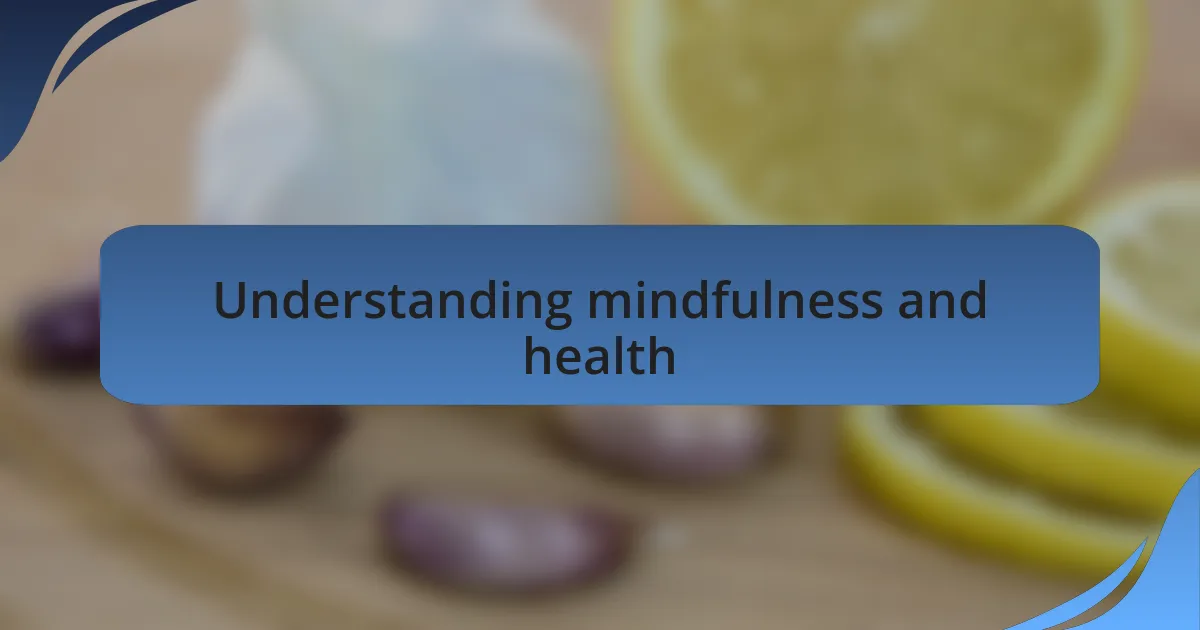
Understanding mindfulness and health
Mindfulness is more than just a trendy buzzword; it holds profound implications for our health. I’ve often found that taking just a few moments to focus on my breath can transform my entire day, especially during stressful times. Isn’t it interesting how something as simple as being present in the moment can have such a powerful effect on our overall well-being?
When I first encountered mindfulness, I was skeptical about its impact on physical health. However, after incorporating mindfulness practices into my routine, I noticed a significant reduction in my anxiety levels. Can focusing on our thoughts and feelings really influence our physical state? Absolutely! Research shows that mindfulness can lower blood pressure and reduce chronic pain, which makes me wonder why more people aren’t embracing it.
My journey with mindfulness has also revealed its impact on emotional resilience. I can recall a particularly challenging time when I felt overwhelmed and lost; practicing mindfulness helped me navigate those feelings. It’s a reminder that when we cultivate awareness of our internal experiences, we not only enhance our mental health but also foster a deeper connection with our physical selves. How does that resonate with you?
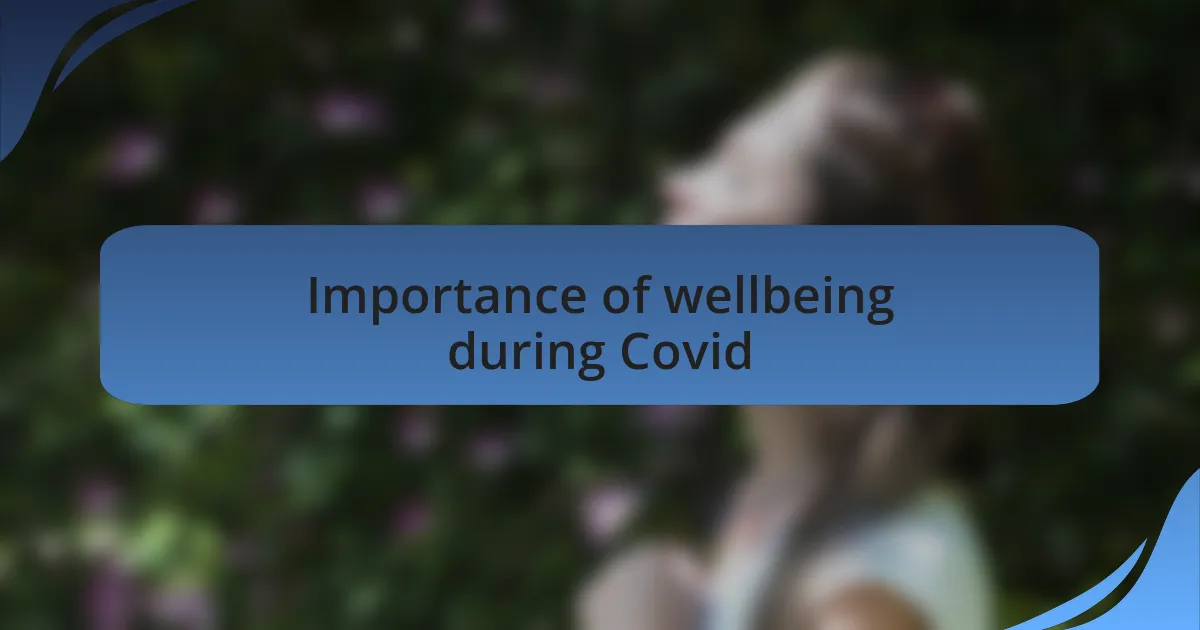
Importance of wellbeing during Covid
Maintaining good well-being during COVID has become essential, perhaps more than ever. I’ve realized how easy it is to feel isolated and anxious, yet prioritizing our mental health can create a strong foundation for everything else in our lives. What if I told you that simply checking in with ourselves regularly can help combat these feelings?
I remember a day when the weight of uncertainty felt particularly heavy. It was during that time I started setting aside ten minutes daily to practice mindfulness. The act of grounding myself in the present not only calmed my racing thoughts but also made me appreciate the little joys, like a warm cup of tea or the sound of rain. Doesn’t it make you think about how small moments can offer relief amidst chaos?
Well-being during this pandemic transcends just physical health; it speaks to our emotional and mental states, too. I’ve seen how connections flourish when we actively care for our well-being. Even a simple phone call to a friend or a moment of meditation has the power to uplift not only ourselves but those around us as well. How can we ensure we prioritize these essential aspects in our daily lives?
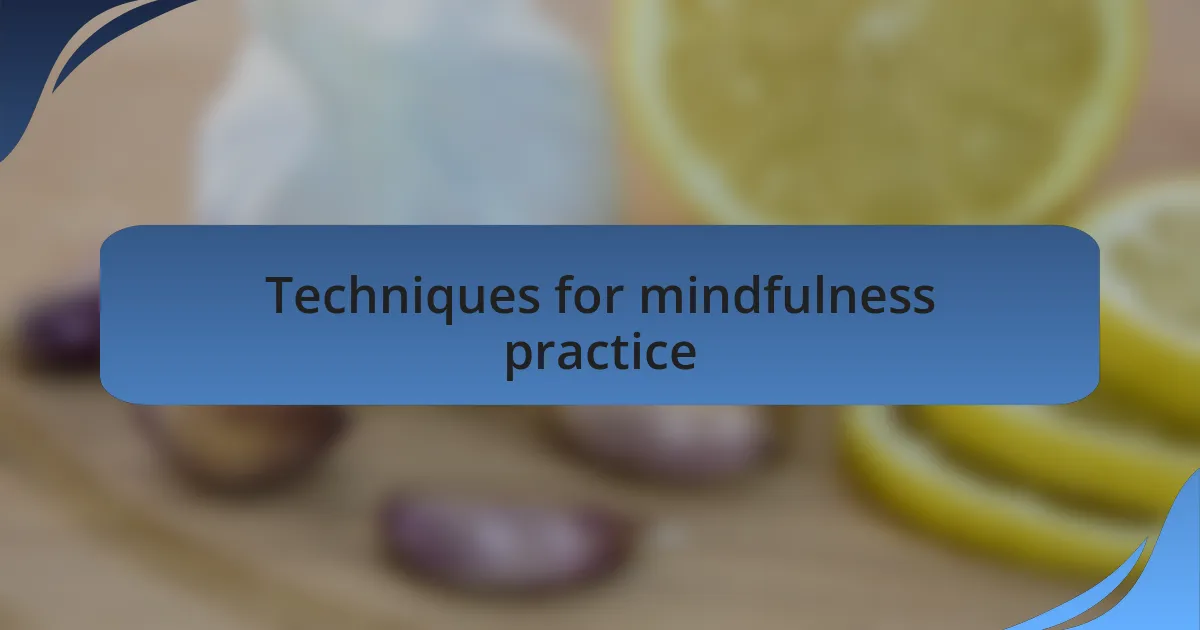
Techniques for mindfulness practice
One effective technique I’ve found helpful is mindful breathing. It sounds simple, but I remember how transformative it was when I focused solely on my breath for just a few minutes. As I inhaled deeply, I could feel the tightness in my chest easing, almost like a weight being lifted. Have you ever paused to notice how your breath can anchor you to the present?
Another technique that resonates with me is body scanning. This practice involves mentally checking in with different parts of your body, noticing any tension or discomfort. I once did a body scan after a particularly stressful week and discovered that my shoulders were tense—the kind of tension I’d been ignoring. By acknowledging it and consciously relaxing those muscles, I felt an instant release. Isn’t it fascinating how our bodies hold onto stress, and how simply tuning in can lead to relief?
Finally, I often incorporate mindfulness into my daily activities, like my morning coffee ritual. I take the time to savor the aroma and flavor, allowing myself to fully engage with the experience. This small change made me realize how often I rush through moments, barely registering them. Have you tried bringing mindfulness to your routines? It’s a game-changer when you realize the richness of life in those ordinary moments.
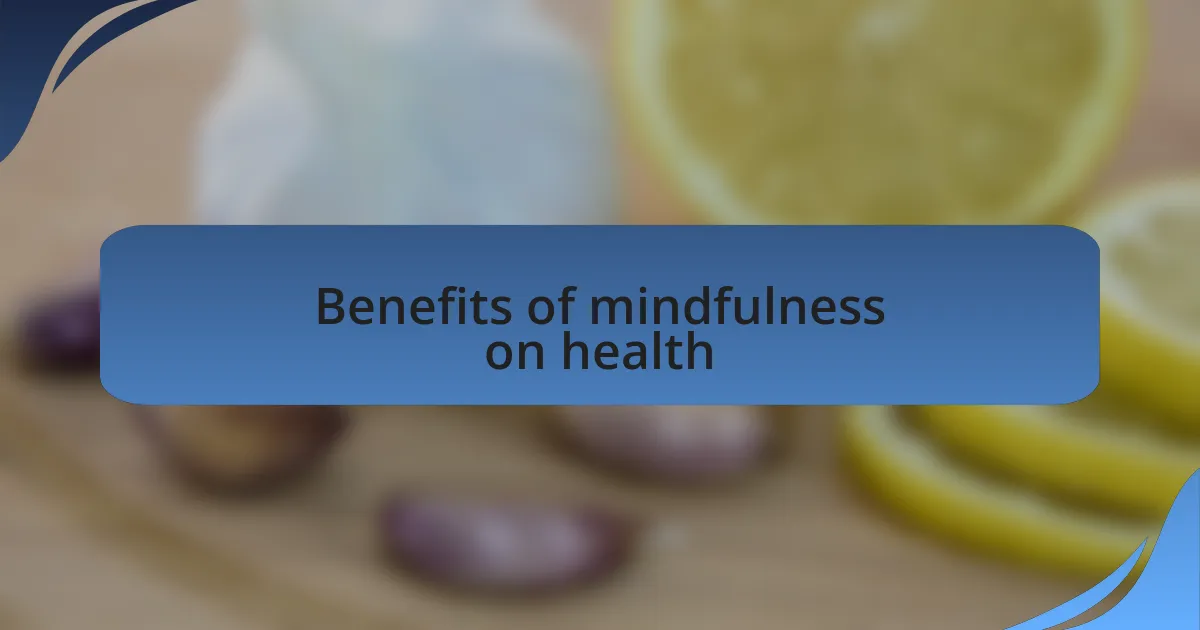
Benefits of mindfulness on health
When it comes to the benefits of mindfulness on health, I’ve observed a profound connection between my mental state and physical well-being. For instance, during particularly stressful periods, I’ve noticed that my immunity dips, leading to frequent colds. But when I commit to daily mindfulness practices, even just for a few minutes, I feel a noticeable boost in my mood and resilience. Isn’t it intriguing how our mental clarity can actually bolster our health?
I also remember a time when I was struggling with insomnia. After adopting mindfulness techniques, like gentle meditation before bed, my sleep quality improved significantly. This wasn’t just about falling asleep faster; it was about feeling more rested and energized upon waking. Have you ever experienced the invigorating feeling of waking up refreshed after a night of deep sleep?
Moreover, I believe mindfulness enhances emotional regulation, which is vital for overall health. There was a challenging period in my life when anxiety was my constant companion. Through mindfulness, I learned to observe my thoughts without judgment and respond rather than react. This shift not only calmed my mind but also improved my relationships. Don’t you think it’s remarkable how understanding our emotions can lead to healthier connections with others?
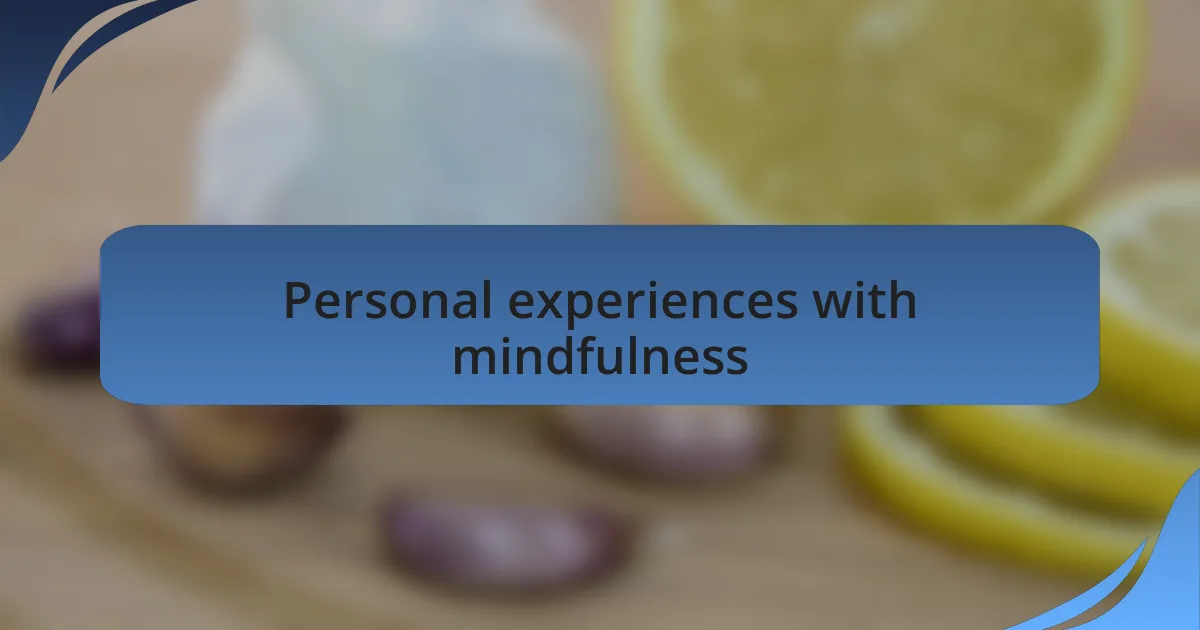
Personal experiences with mindfulness
Finding mindfulness in my daily routine has been transformative. One particular afternoon, feeling overwhelmed by work and life’s demands, I set aside just ten minutes for mindful breathing. I closed my eyes and focused solely on my breath. The moment felt like hitting a reset button; the chaos receded, leaving me with a clarity I didn’t realize I needed. Have you ever taken just a few moments to breathe deeply and felt the heaviness lift?
There was also a weekend when I decided to try a mindful walk in nature. As I strolled, I intentionally focused on the sounds around me—the rustling leaves, the chirping birds, and even the distant laughter of children playing. It was an experience of pure presence, and I found myself smiling at the little things that usually go unnoticed. Does stepping away from our routine to engage with nature ever remind us how simple joys can elevate our spirit?
Another time, I remember attending a mindfulness workshop, hesitant but curious. The instructor guided us through a body-scan meditation, asking us to connect with each part of our body. I felt a wave of gratitude wash over me as I acknowledged parts of myself I typically took for granted. Was I alone in discovering that tuning into our bodies can reveal both tension and peace? This realization deepened my appreciation for mindfulness as a tool for self-discovery and healing.
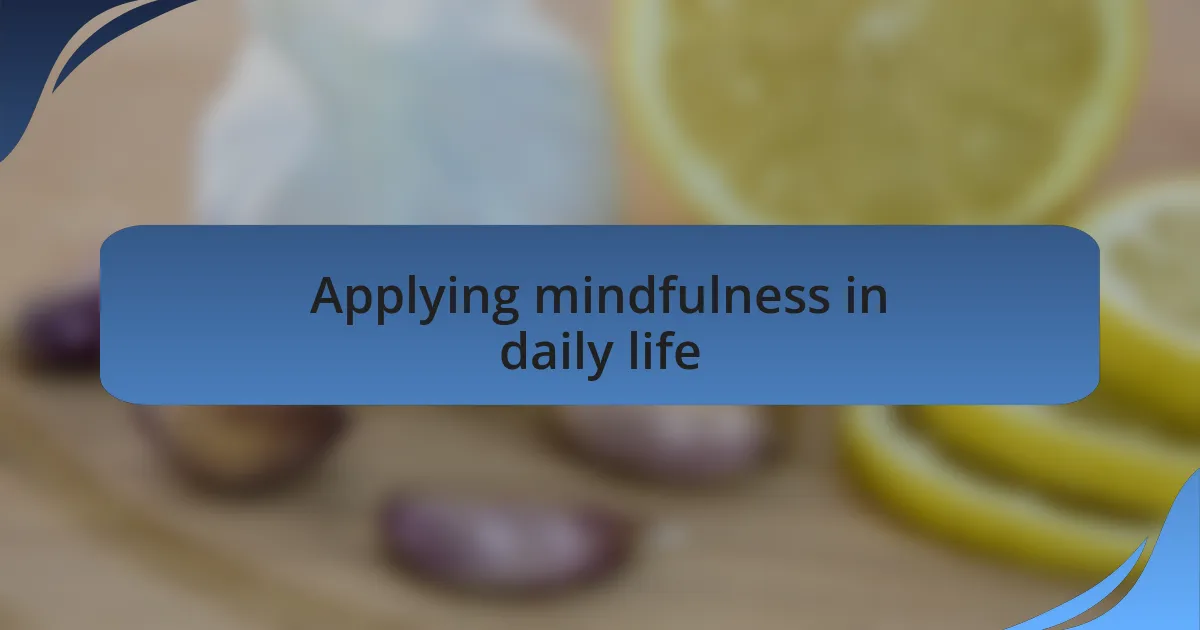
Applying mindfulness in daily life
In my experience, integrating mindfulness into daily life can be surprisingly simple. Just the other day, I found myself caught in a flurry of email notifications. Instead of rushing to respond, I took a moment to pause, closed my eyes, and practiced a brief grounding exercise. I felt the tightness in my shoulders ease, and I returned to my tasks with renewed focus. Have you ever noticed how taking just a moment to breathe can transform your whole outlook on the day?
One of my favorites ways to apply mindfulness is during routine tasks, like washing dishes. Instead of letting my mind wander to the day’s to-do list, I immerse myself in the sensations—the warmth of the water, the scent of the soap, and the rhythm of my hands. It becomes almost meditative. Have you considered how such mundane actions hold potential for mindfulness?
Even during conversations, I consciously practice being fully present. I’ve started putting my phone away and making eye contact, allowing myself to connect with the person in front of me. I’ve noticed that these moments of intentional focus not only enhance my relationships but also create a deeper sense of joy and understanding. Isn’t it fascinating how mindfulness can transform our interactions with others, making them more meaningful?
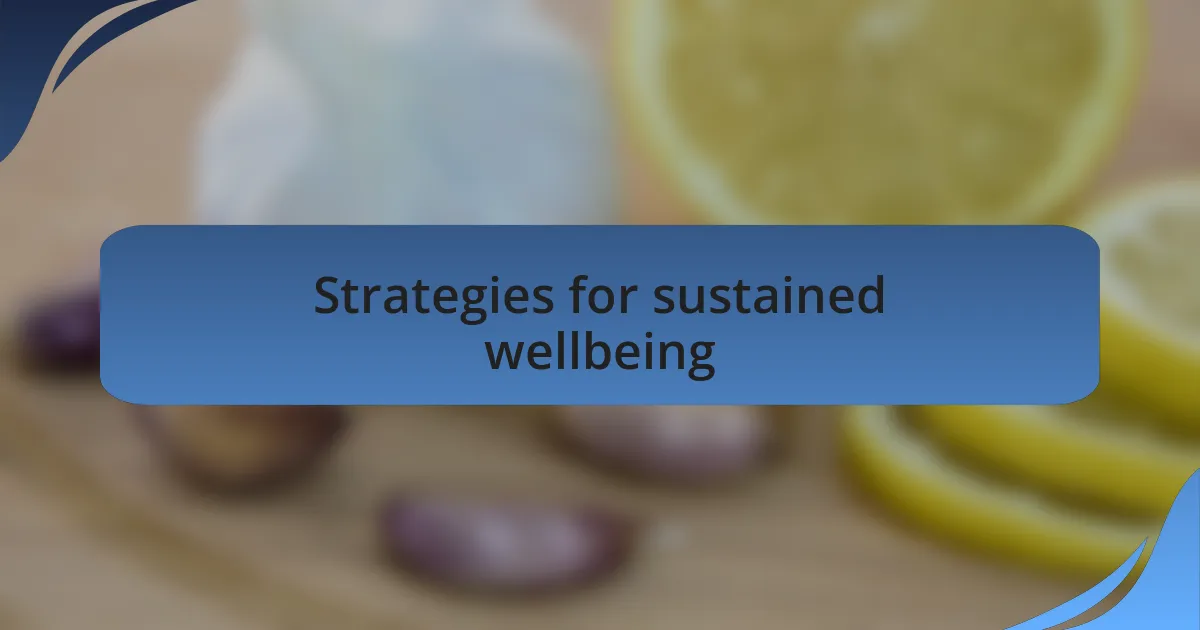
Strategies for sustained wellbeing
In my journey towards sustained wellbeing, I’ve found that setting aside time for reflection at the end of each day can be incredibly beneficial. I often sit in a quiet space, take a few deep breaths, and consider what went well and what didn’t. This simple practice not only helps me recognize my progress but also brings clarity to my thoughts. Have you ever tried making it a habit to check in with yourself before sleep?
Another strategy that resonates with me is embracing the outdoors as a form of therapy. I recall a particularly stressful week when I decided to take my work to a nearby park. The fresh air and sounds of nature acted as a balm for my mind. I realized how essential it is to step outside our usual environments, allowing nature to refresh our spirits. How often do we underestimate the power of a simple walk in the park to lift our mood?
It’s also important to foster connections that uplift us. I’ve learned that surrounding myself with positive, supportive people plays a crucial role in maintaining my wellbeing. For instance, I make it a point to set virtual coffee dates with friends where we share not just our struggles but also our victories. These moments of connection remind me just how vital community is for mental health. Are you nurturing your relationships, or are they getting lost in the busyness of life?